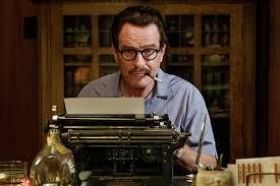 The new movie Trumbo is the true story of screenwriter Dalton Trumbo, the most prominent of the “Hollywood 10,” a group of movie artists who were jailed in 1947 for refusing to testify before Congress when they were called in front of the House Un-American Activities Committee. They were all suspected of being members of and/or having ties to the Communist party and were subsequently blacklisted in Hollywood, making it impossible for them to work. It destroyed careers and lives, and the effects of the blacklist was felt for decades. It is an absolutely essential American story to be told and I, for one, cannot believe it’s taken this long to get to the screen.
The new movie Trumbo is the true story of screenwriter Dalton Trumbo, the most prominent of the “Hollywood 10,” a group of movie artists who were jailed in 1947 for refusing to testify before Congress when they were called in front of the House Un-American Activities Committee. They were all suspected of being members of and/or having ties to the Communist party and were subsequently blacklisted in Hollywood, making it impossible for them to work. It destroyed careers and lives, and the effects of the blacklist was felt for decades. It is an absolutely essential American story to be told and I, for one, cannot believe it’s taken this long to get to the screen.
Maybe it’s because this is the perfect time for Trumbo. A movie about a man standing up for what he believes in—and getting unfairly persecuted for it—feels perfect right about now. And, especially now, when it feels like history’s a bubbling cauldron everywhere you look in the world, a story from sixty years ago that could easily be played out today if we allow it, Trumbo is not only still relevant, but bone-chillingly familiar.
Want to know another thing that feels right just about now? A great American ensemble piece. Led by veteran American chameleon Bryan Cranston, Trumbo is loaded with great talent, nearly all from this side of the pond, which is, quite frankly, a nice reminder that, yes, Americans can act too. It’s taken Cranston a long time (35 years, to be exact) to get his first studio movie starring role (I don’t count Godzilla—the creature was the star) and it’s been a long time coming and well deserved. He’s surrounded by other veteran actors, most notably Michael Stuhlbarg and John Goodman, two of the best working actors in Hollywood, bar none. Diane Lane, Elle Fanning, Louis C.K., David James Elliott, Alan Tudyk and the lone Brit, Helen Mirren, round out the impressive cast, who all bring classic Hollywood to life with energy and panache.
The best part about Trumbo is exactly that classic Hollywood that comes to life on screen. We see everyone from Edward G. Robinson to John Wayne to Kirk Douglas to Louis B. Mayer to Hedda Hopper, mixed in with real filmreels and movie footage. It’s tons of fun to see these classic figures come to life and be on the sets and romp around old Hollywood backstage and at film premieres—but something about the tone of Trumbo just never feels right. Director Jay Roach, who made his mark in Hollywood with snarky comedies like Austin Powers and Meet the Parents, keeps it a bit too light and jaunty for the subject matter here. There’s a feeling, even with some of the most serious issues in the movie, like prison and family abandonment, that these moments are almost glossed over, barreled through by the force of Trumbo’s oversized personality (and, unfortunately, Cranston’s overplayed characterization), so they are almost forgotten entirely—or, worse, forgiven. It doesn’t help that the screenplay feels even lighter. Written by John McNamara, who has written only for television before this (and nothing you’ve heard of), it feels lacking in any emotional depth and is saved only by the fact that these actors are saying these lines.
Trumbo rides high for the first two-thirds of the movie, on the strength of the overdue-to-be-told story and the high-energy performances, but, unfortunately, the lack of depth of talent behind the camera catches up to it as the momentum slows painfully just past the midway point. But, still, despite an overly breezy and lightweight telling, Trumbo is a tale deserving to be heard and, while far from perfect, it’s one worth your time.
